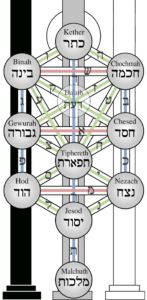Just One Mississippi Redneck’s Jew Of The Metaphysical, Kaballah, Jerry Falwell, Physics, Tolerance, Forgiveness, Life, Liberty, And Justice For All
I am not an expert or authority on religion, new age beliefs, physics (or much of anything else for that matter); one might say I could now be “a pseudo-expert” regarding cartooning or e-commerce, but I think anyone becomes “an expert” at just about anything after persisting and doing it long enough.
The topic (or topics if you will) of this article regards matters such as energy vortexes, New Age religion, traditional religion, paganism, etc. and how they all have similarities, yet are so very different in traditions. It talks about why we are here, why we believe what we do, what we can do (or not do) with it, and a myriad of ramblings that, sometimes, I get in the mood to discuss. Again, I do not claim to be an expert on any of them, simply thoughts from readings and observations. I am a believer, but I certainly don’t demand it or judge others if they are not.
Paganism
I guess the place to start is with paganism. How the word “pagan” ever got a negative connotation from anyone is beyond me. It is an ancient Greek word meaning “rural dweller” or “person or family living outside of a city”.
 The ancient pagans did not really behave that much different than city-dwellers, except for the fact that since they relied so intensely on nature, that is, mostly farming, they were considered to worship it. Fruits, berries, herbs, etc. were used as medicines. G-d (we use the spelling of G-d in Judaism and I happen to be a believer, which has very little to do with my story or observations).
The ancient pagans did not really behave that much different than city-dwellers, except for the fact that since they relied so intensely on nature, that is, mostly farming, they were considered to worship it. Fruits, berries, herbs, etc. were used as medicines. G-d (we use the spelling of G-d in Judaism and I happen to be a believer, which has very little to do with my story or observations).
So when the Torah (or first bible, or Jewish Bible or often referred to as The Old Testament) was written; much was included about the wisdom of “the country-dweller” or “rural person” and their behavior.
In fact, we all know from both Old and New Testaments the term “…and the fruits from the trees shall be thy medicine”. (I may have the exact phrase wrong). That was pagan wisdom long before we ever thought about it.
In both testaments also, most, if not all, revered religious leaders were chosen by G-d for the main reason. They were good shepherds. In His eyes, anyone who could take care of animals could take care of his people. In fact, the very reluctant leader Moses allegedly asked G-d “Why me?” The answer was, “Because anyone who can lead animals to safety and be a good shepherd shows me he can do the same for people”.
We all know of other “Good Shepherds” in both testaments. Jesus’ reputation as a good shepherd is unsurpassed in the history of the world.
In early paganism, animals were of the utmost importance. Taking care of animals is one of the 613 Commandments in Judaism (yes there are 613; most of us only know of the “Top Ten”). One of them is a commandment that one’s animals must be fed before feeding oneself.
Many people are now fascinated by the teachings of Kaballah. Kaballah is considered a mystical interpretation of the Torah, and if practiced correctly it improves the lives of the reader or “receiver” (Kaballah actually means “To Receive”).
 A problem exists, though; and I am not saying it is bad to read the Kaballah and try to practice it’s valuable and positive lessons (there is also a Christian version of Kaballah, now I am told though have not read it but plan to).
A problem exists, though; and I am not saying it is bad to read the Kaballah and try to practice it’s valuable and positive lessons (there is also a Christian version of Kaballah, now I am told though have not read it but plan to).
The challenge is, (and the debate is still raging) can it be done (understanding and practicing the wisdom of Kaballah without reading and understanding the Torah first)? Ancient scribes and modern-day scholarly rabbis say “no way, it’s a waste of time to try”.
I don’t have an opinion on it, but it only makes sense to me. An analogy might be a very bright junior high student. At times one is so bright they are put into college, and not made to graduate from high school. Though many do well academically, the emotional strain is too much. History is loaded with such great young minds. And because of that, education has changed dramatically in the past four decades and it is not done so often. New more challenging alternative programs have been developed for “the gifted child” to be challenged throughout middle and high school academia and entering college at a more appropriate age.
Such is trying to graduate from Torah, it appears, and going straight to Kaballah, which, admittedly is much “more fun and interesting to talk about at parties, but has anything really dramatically transpired to help that person? Maybe so, maybe not. Again, I am no expert. I know in my own case, I tried to go straight to Kaballah and found it very confusing.
I was not brought up religiously so I did not learn the Torah (I am not proud of that) but it was just my reality. Now I am trying to read and learn from it; the end game is not “to graduate” one day to Kaballah, but if I feel I truly understand the Torah one day and am “living it” as it teaches, I may not even find I need Kaballah. I tend to have good instincts and to often understand the mystical underpinnings of most philosophies. I may find I want to learn and practice it. I have no expectations and they are not really important. I will know when the time is right if it is something I want to study or something I don’t. Either way, life will go on, the world will turn, and change will happen. Not a lot of people (except me) will care what I read or what I learn from it, to be frank. And that’s ok.
Whatever we read, learn, practice, etc. it is not to improve others, it is to improve ourselves. We often get that mixed up. “I am going to learn this so I can ‘save the world’ or ‘teach it something special’.” Oh, if only that were true. My learnings have been that only when we improve ourselves, not our wives, not our cousins, not our grouchy uncle or in-laws, do we improve the world.
And there are other New Age Religions and schools of thought. Though many offer excellent pragmatic practices to work on the body, soul, spirit (though I do not practice the religion of Buddhism, for instance, I am impressed with it introducing us to incorporating the body, along with the mind and spirit, as even modern medicine seems to agree they are all interconnected, and yoga, meditation, etc. seems to help many no matter what their religion, or if they have none at all.
Other than the aforementioned religions, though I certainly cannot berate anything “New Age” as I have seen such programs help many people, I have reached a conclusion after studying (and even practicing) some of them, there really is nothing new but the words and interpretations and sometimes those are lacking.
If I have “a beef” with anything New Age, it is the ones we have seen cropping up since the 1960s that usually come and go after the founder has made his dollars, that teaches us if “we wish something and pray hard enough for it we will get it. That is a bit transparent to me, though very common and it appears a new one crops up every half-decade ago with beautiful glossy brochures, slick videos, and great testimonials from “people we trust” (who were paid big-time for their contribution to “the cause”. We are likely to see many more of those in our lifetime, simply because they are attractive and popular. But I could hardly call them “anything new”. The ones I have seen are copies of everything from EST to a dozen of others long before this century.
But I think it is a good culture for people who want fellowship, and happen to have a belief in their God (which I tend to think is the same as the one I believe in but that is just me), but don’t want to get “tied into” or “lured into” the “politics of traditional religion”.
So certainly, though nothing new, they serve a positive purpose.
Back to paganism.
Do you live in an energy vortex? I do. But is this “junk science”, religion, paganism, or just the universe at work.
I do not have the answer but I do know that physicists agree that energy vortexes do exist and some extraordinary things occur if one is in the center of one. I will not go into the details of what an energy vortex does and does not do, simply because I would be making up things that I have not researched carefully. Allegedly if you live in an energy vortex you live in a place where nature blossoms more easily; two examples are Findhorn, Scotland and Hot Springs, Ar (there are many more). In Findhorn, allegedly roses and other flowers are known to grow four to seven sizes larger than a regular rose (other flowers and vegetables too).
Diamonds become bigger (last year the second largest yellow diamond ever found was in Hot Springs, Ar.).
The energy vortex supposedly affects people as well. The crime rate is lower, people are more cheerful, the suicide rate is lower, the economy is better, etc. Again, I use the word “supposedly” or “allegedly” because I cannot prove it in any way, shape or form.
So as we look back at belief systems, etc. and take off all our “opinion attire” we find, that really people are people no matter what their thought, philosophy or religion.
Some may think they have discovered something new about religion, philosophy, etc. and I say “Good for them. Maybe we can all make good use of it in helping each other along this voyage called life.”
In any case, I say study and study hard, if one wants to find answers. I am hardly “there yet”; I am a newbie who is just trying to learn, at age 52, why I’m here, what can I do to make a difference in the world, what G-d wants of me and how he wants me to be of service.”
In a way, we are all “newbies”; I don’t think the most scholarly minister “graduates” to “know” anything more than the rest of us. There is no privacy code in philosophy and religion It is one thing that is free if we want it to be (that is, our belief systems).
Forgiveness is important.
Even if we strongly disagree with someone. I will give you an example. We know that Dr. Jerry Falwell died recently. The attacks were fast and furious. Though I did not agree with Jerry Falwell’s philosophies (not most of them), I know he was a human being trying his best to do something in the world based on his belief systems. Did he hurt people? Probably. Did he help people? Probably. But he was only a human like you and me. He may have had a higher station in life than many of us, but still a human with the same fears, demons of the past, and issues to overcome.
 If you are gay, had an abortion, very liberal, anti-fundamentalist/or anti-Falwell, and do not forgive what you perceive he has “done to you”, are you (or I) really any different than what we may have perceived him to have been? I think not. Again, I was not a fan of Jerry Falwell’s philosophies, but, I am reconciled that he was a human being, trying to do his best, and help others and his family Even if you perceive he could not forgive you for “your sins”, why not practice forgiving him? At the very least, give his family time to grieve; they loved him dearly, even if you or I judged him by his philosophy. He was still a man, and for us to label him “good” or “bad” is playing G-d. I am sure like the rest of us, he did some things very well and some things not so very well. He simply had more visibility. It was easier to look at him than look at “me” or “you”.
If you are gay, had an abortion, very liberal, anti-fundamentalist/or anti-Falwell, and do not forgive what you perceive he has “done to you”, are you (or I) really any different than what we may have perceived him to have been? I think not. Again, I was not a fan of Jerry Falwell’s philosophies, but, I am reconciled that he was a human being, trying to do his best, and help others and his family Even if you perceive he could not forgive you for “your sins”, why not practice forgiving him? At the very least, give his family time to grieve; they loved him dearly, even if you or I judged him by his philosophy. He was still a man, and for us to label him “good” or “bad” is playing G-d. I am sure like the rest of us, he did some things very well and some things not so very well. He simply had more visibility. It was easier to look at him than look at “me” or “you”.
As I grow older and (I hope) wiser, I am aware that there are many people who love me, hate me, or are ambivalent and have no feelings whatsoever about me (I imagine most are neutral). None of that matters.
What others think of me is really none of my business (and my gut instinct tells me they don’t think about me very often). Most people are much more engaged in what others are thinking about them than that eccentric writer named Rick London. It is really what I think of me, and when I discover the character defects in me (which are much easier at an older age, try my best to change them to become a better person. It doesn’t always happen but when it does I am elated. Often-times others don’t even notice (or care for that matter). But I care.
After about six years of being interested in it, and studying it, I have learned one very valuable lesson. When I decide to make a friend or not make a friend, it has nothing to do with his or her religion (or lack thereof); it is his or her treatment of other people, animals, and respect for other humans and life in general, and of course, the planet in which we live.
Change is gradual. Two decades ago, my focus and only goal were to a. become rich and famous b. have my share of women but “trade them in” when I got tired of them, not even thinking of their feelings, and that was about it.
I, of course, look back at “that person” who was me with disdain, but as I talk to other adults my age, I find I am not alone.
I am a better person now, probably because life itself makes one humble and one finally realizes there is (most likely) a G-d in charge and no matter what I think I want or need, I am but a “player on the stage” (as Shakespeare said) trying to do my best. I hope you’ll join me in trying to learn this very interesting thing called life.






